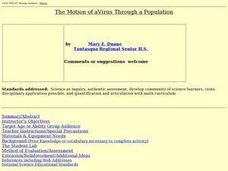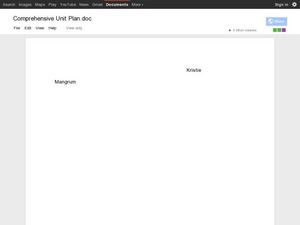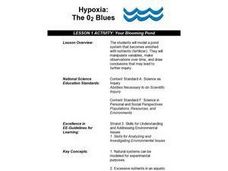Curated OER
Food Safety
Students recognize that safe food preparation is important to good health. In this food safety instructional activity, students participate in an activity students separate, clean, chill, and cook food safely. Students use Glo Germ...
Curated OER
Ready to Remain Safe
Eighth graders discuss making the wrong decisions because of peer pressure and the consequences of those actions. As a class, they identify the positive and negative consequences based on a variety of scenerios. To end the lesson, they...
Curated OER
Escape! Because Accidents Happen-Fire
Students view a video clip about fire safety. They work together to research fire safety strategies in public and private buildings. They create a prototype of a building using safety measures.
Curated OER
The Dirt on the Workplace
Students examine health and safety issues in the workplace. They, in groups, discuss how health and safety issues effect their lives.
Curated OER
Dogfighting and the Community
Students discover the threats to dogs by investigating dogfighting. In this animal cruelty activity, students read the state laws pertaining to animal safety and dogfighting. Students compile dogfighting facts into a poster...
Curated OER
Machine Guarding
Twelfth graders describe at least two of the main causes of machine accidents. Possible responses: Unauthorized persons doing maintenance or using the machines. Missing or loose machine guards. List three of the requirements for...
Curated OER
Heavy Issues
Fourth graders compare the difference between the mass of people, vehicles and trains in order to explain why it is important not to trespass on railroad tracks.
Mascil Project
Water Quality
How do you prevent the spread of water-borne illness in large public swimming areas? Scholars discover the challenges to identifying safe water through an inquiry experiment. They then produce posters sharing their understanding of water...
Curated OER
Take a Stab!
Your geology class practices taking core samples of a potato to examine the stratigraphy. This is a terrific modeling activity that helps youngsters visualize strata that cannot be seen from the surface of the ground. The directions...
Curated OER
The Power of Atmospheric Pressure Process
Students are introduced to the basic principles of atmospheric pressure. After watching demonstrations, they discover the capability of air pressure and how it affects weather. In groups, they use an inquiry template to solve different...
Curated OER
The Motion of a Virus Through a Population
Students test the factors that influence the rate at which a virus spreads through a population. They complete a lab activity then discuss data collected and review and answer a set of questions.
Cornell University
Atomic Bonding
Explore the connection of surface area to bonding within atoms. Learners complete lab investigations to model changing surface area with different sizes and concentrations of atoms. A flour fireball demonstration follows the labs to...
Curated OER
Contraceptives: Which Work Best?
Learners discover human health by identifying contraceptive methods. In this sexual health lesson, students discuss the different methods used to prevent births and STD contraction. Learners read assigned text which describes each method...
Curated OER
Magnetic Discovery Bottle
Students examine how to conduct simple investigations and use simple equipment to gather data. In this magnet lesson plan students decide what types of objects are attracted to magnets.
Curated OER
Castaway or Survivor
What a clever idea! Chemistry learners imagine themselves deserted on an island with a radio, but no batteries. They also have a few odds and ends in their pockets and storage chest. They are challenged to create a battery that will...
Curated OER
Waste Management
Four different activities focus on the amount of trash generated and how humans can better manage waste. Learners analyze two days' worth of household garbage, test materials for biodegradability, and rate recyclability of various...
BBC
Crime
Crime and punishment! Learners discuss the law, civics, and crime in the UK. They brainstorm lists of crimes and possible punishments, complete activities on a website, role-play a Juvenile Court scenario, and try to think of ways they...
Curated OER
Heat Pollution and Communities
Learners examine thermal pollution by collecting temperature data on the school's photovoltaic panel. Students collect data for four consecutive days and retrieve information from other classes that meet at different times of the day. ...
Curated OER
Waste Management
Students investigate the amount of trash they generate, the problems that result and possible solutions.They complete four activities regarding household trash, biodegradability, packaging, and recycling.
Curated OER
The Built Environment-An Integrating Theme
Students observe, record, and present knowledge of their local built environment while conducting a walking tour of their community. They develop written and photo journals, drawings, time lines, graphs, and charts to engage in...
Curated OER
The Life Cycle of the Mealworm
Fourth graders provide a habitat for live mealworms and observe their life cycle. In this animal life cycle and scientific inquiry instructional activity, 4th graders create a habitat for a live mealworm and observe and record related...
Curated OER
The Changing Times of My Life
First graders discuss different milestones in their life such as bathing, dressing, eating, walking, etc. They brainstorm ideas of how the changes affected their life from the moment they occurred to the present. Students brainstorm and...
Curated OER
Child Abuse and the Trial Process
Students identify the elements of child abuse and neglect. Using this information, they relate it to the laws in their home state. They read scenerios and ask questions to determine if child abuse is present. They review the trial...
Curated OER
Your Blooming Pond
Young scholars model a pond system that becomes enriched with nutrients (fertilizer). They manipulate variables, make observations over time, and draw conclusions that may lead to further inquiry. They, in groups, simulate a pond...























